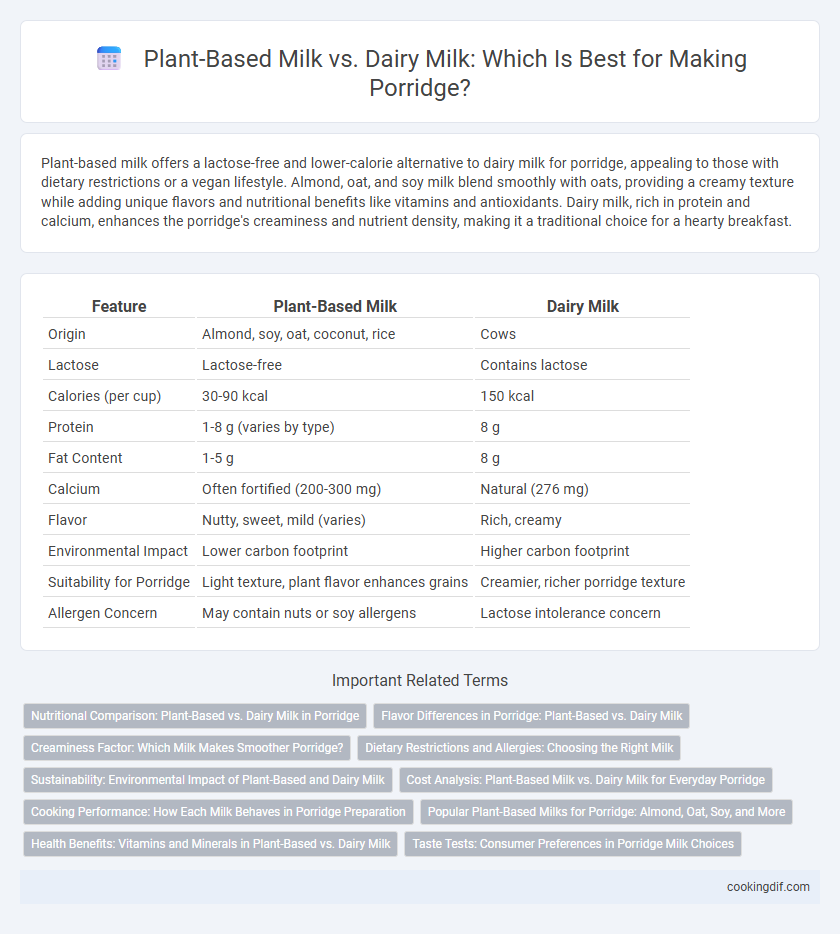Plant-based milk offers a lactose-free and lower-calorie alternative to dairy milk for porridge, appealing to those with dietary restrictions or a vegan lifestyle. Almond, oat, and soy milk blend smoothly with oats, providing a creamy texture while adding unique flavors and nutritional benefits like vitamins and antioxidants. Dairy milk, rich in protein and calcium, enhances the porridge's creaminess and nutrient density, making it a traditional choice for a hearty breakfast.
Table of Comparison
| Feature | Plant-Based Milk | Dairy Milk |
|---|---|---|
| Origin | Almond, soy, oat, coconut, rice | Cows |
| Lactose | Lactose-free | Contains lactose |
| Calories (per cup) | 30-90 kcal | 150 kcal |
| Protein | 1-8 g (varies by type) | 8 g |
| Fat Content | 1-5 g | 8 g |
| Calcium | Often fortified (200-300 mg) | Natural (276 mg) |
| Flavor | Nutty, sweet, mild (varies) | Rich, creamy |
| Environmental Impact | Lower carbon footprint | Higher carbon footprint |
| Suitability for Porridge | Light texture, plant flavor enhances grains | Creamier, richer porridge texture |
| Allergen Concern | May contain nuts or soy allergens | Lactose intolerance concern |
Nutritional Comparison: Plant-Based vs. Dairy Milk in Porridge
Plant-based milk options such as almond, oat, and soy milk vary significantly in protein, calcium, and vitamin D content compared to dairy milk, often leading to lower natural protein levels but fortified nutrients. Dairy milk provides a complete protein profile and higher calcium per serving, essential for bone health, making it a nutrient-dense choice for porridge preparation. When choosing between plant-based and dairy milk for porridge, consider the specific nutritional needs, including macronutrient balance and potential dietary restrictions or preferences.
Flavor Differences in Porridge: Plant-Based vs. Dairy Milk
Plant-based milk varieties, such as almond, oat, and soy, impart distinct, often nuttier or creamier flavors to porridge, enhancing its taste profile with subtle sweetness or earthiness. Dairy milk provides a rich, creamy texture and a naturally sweet taste that complements the porridge's neutral base, resulting in a classic, comforting flavor. Choosing between plant-based and dairy milk significantly affects the overall sensory experience and can cater to dietary preferences or lactose intolerance.
Creaminess Factor: Which Milk Makes Smoother Porridge?
Plant-based milk varieties like oat and almond milk often produce creamier porridge due to their natural fat content and smooth texture, enhancing the dish's richness. Dairy milk, particularly whole milk, offers a thickened mouthfeel and classic creaminess from its higher saturated fat levels, making porridge velvety and satisfying. Choosing between them depends on preference for creaminess intensity and dietary considerations, with oat milk frequently praised for its ability to create the smoothest porridge consistency.
Dietary Restrictions and Allergies: Choosing the Right Milk
Plant-based milk such as almond, soy, or oat offers a suitable alternative for those with lactose intolerance or dairy allergies while maintaining creamy texture in porridge. Dairy milk contains lactose and common allergens like casein, making it unsuitable for individuals with specific dietary restrictions or milk protein allergies. Selecting milk based on allergen presence and dietary needs ensures porridge is safe and enjoyable for everyone.
Sustainability: Environmental Impact of Plant-Based and Dairy Milk
Plant-based milk has a significantly lower environmental impact than dairy milk, using less water and producing fewer greenhouse gas emissions per liter. Oat milk and almond milk require substantially less land compared to cow's milk, contributing to reduced deforestation and biodiversity loss. Choosing plant-based milk for porridge supports sustainable consumption by minimizing resource use and lowering overall carbon footprints.
Cost Analysis: Plant-Based Milk vs. Dairy Milk for Everyday Porridge
Plant-based milk alternatives like almond, soy, and oat generally cost more per liter compared to conventional dairy milk, impacting the overall expense of everyday porridge preparation. Dairy milk typically offers a lower price point and higher availability, making it the more economical option for budget-conscious consumers. However, factors such as dietary preferences, lactose intolerance, and environmental considerations often influence the choice beyond simple cost comparisons.
Cooking Performance: How Each Milk Behaves in Porridge Preparation
Plant-based milk such as almond, oat, or soy tends to cook faster and produces a creamier texture in porridge due to its natural thickness and lower protein content compared to dairy milk. Dairy milk offers a richer taste and better protein structure, resulting in a firmer consistency and enhanced browning during cooking. Choice between plant-based and dairy milk affects porridge's cooking time, texture, and flavor intensity, catering to dietary preferences and desired mouthfeel.
Popular Plant-Based Milks for Porridge: Almond, Oat, Soy, and More
Almond, oat, and soy milk are among the most popular plant-based alternatives for porridge, each offering unique flavors and nutritional benefits. Oat milk provides a creamy texture and natural sweetness that enhances the porridge experience, while soy milk contributes higher protein content comparable to dairy milk. Almond milk offers a light, nutty taste with lower calories, making it a favored choice for those seeking a dairy-free option without compromising flavor.
Health Benefits: Vitamins and Minerals in Plant-Based vs. Dairy Milk
Plant-based milks like almond, soy, and oat offer diverse vitamins and minerals, including vitamin E, calcium, and iron, with lower saturated fat than dairy milk. Dairy milk provides higher levels of vitamin B12, riboflavin, and naturally occurring calcium essential for bone health. Choosing between plant-based and dairy milk for porridge depends on nutritional priorities such as vitamin B12 intake or reducing cholesterol through plant-based options.
Taste Tests: Consumer Preferences in Porridge Milk Choices
Consumer taste tests reveal that plant-based milks like oat, almond, and soy offer distinct flavor profiles that influence preferences in porridge milk choices. Oat milk, favored for its creamy texture and subtle sweetness, often ranks highly among consumers seeking a dairy alternative. Dairy milk remains preferred for its rich, traditional taste and natural creaminess, highlighting a balance between classic flavor and evolving plant-based trends.
Plant-based milk vs Dairy milk for porridge Infographic

 cookingdif.com
cookingdif.com